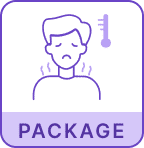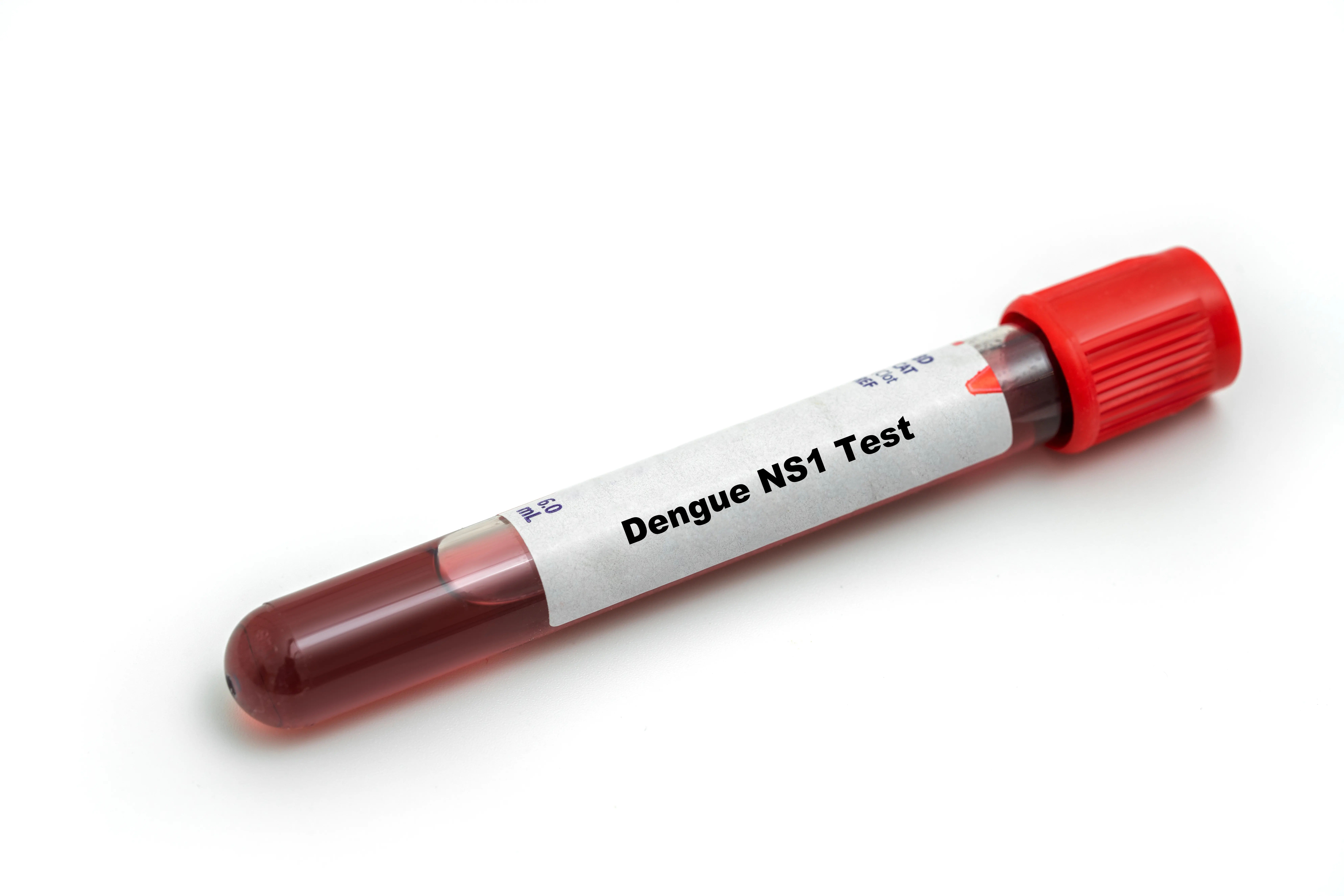Fever After School? Dengue NS1 Test for Kids in the Monsoon
Fever after school during monsoon can be a warning sign of dengue in children. Understand when to opt for a Dengue NS1 test, its benefits, and how early detection helps in recovery.

Written by Dr. Rohinipriyanka Pondugula
Reviewed by Dr. J T Hema Pratima MBBS
Last updated on 11th Aug, 2025
.webp?tr=q-80,f-webp,w-350,dpr-2,c-at_max 700w)
When children return home from school feeling weak, burning with fever, or complaining of aches, many parents worry if it’s something more than a mild cold. During the monsoon season, these worries become sharper, mosquitoes are everywhere, and dengue is on the rise. If your child has a sudden high fever, especially during or after school hours, it may be time to consider a Dengue NS1 test for children. Dengue spreads rapidly in the rainy season, especially in tropical countries like India, where stagnant water becomes a breeding ground for mosquitoes. Kids aged 5 to 16 are particularly vulnerable because they spend time outdoors, in school playgrounds, buses, or tuition classes, often unaware of mosquito bites. And since dengue symptoms mimic common viral fevers, early testing becomes crucial. In this article, we’ll explain what dengue is, how the Dengue NS1 early test for kids works, why it matters during school season, and how Apollo 24|7 makes dengue screening convenient for parents everywhere.
Why Monsoon and School Increase Dengue Risk in Kids?
The monsoon season brings relief from summer heat but also leads to waterlogging, uncovered drains, and mosquito breeding near schools, homes, and bus stops. Schools, despite their best efforts, can’t always control outdoor exposure or ensure every child uses mosquito repellents. Here’s why your child could be at risk:
- Increased mosquito activity: The Aedes mosquito, which carries the dengue virus, thrives during humid monsoon months.
- School environments: Open windows, water-logged grounds, or uncovered water storage areas at schools can be breeding sites.
- Afternoon classes or coaching: Children attending extra classes often stay out during peak mosquito hours.
- Lack of awareness: Younger kids may not understand the importance of wearing full sleeves or using repellent.
When children develop a fever after school, especially with body aches or rashes, it's best not to delay testing. The Dengue NS1 test for children is a fast and reliable way to rule out or detect dengue early, before it becomes severe.
Understanding Dengue and Why Early Detection is Critical
Dengue is a viral illness transmitted by the bite of infected female Aedes aegypti mosquitoes. It cannot spread directly from one person to another. The virus has four different strains, and unfortunately, catching dengue once doesn't guarantee protection from the others. This means reinfection is possible and potentially more serious.
Key symptoms of dengue in children include:
- Sudden high fever (often above 102°F or 39°C)
- Headache or pain behind the eyes
- Body aches or joint pain (“breakbone fever”)
- Skin rashes, especially after the fever subsides
- Nausea or vomiting
- Tiredness, loss of appetite
These symptoms are similar to seasonal flu or viral fever. That's why the dengue early test for kids, especially the NS1 antigen test, is crucial, it detects the virus in the blood within the first few days of infection, even before antibodies are formed.
Book Dengue NS1 Antigen test Here
What Is the Dengue NS1 Test for Children?
The Dengue NS1 Antigen Test is a blood test that detects the non-structural protein 1 (NS1) antigen, which is released into the blood during the early stages of a dengue infection.
- When is it done: It is most effective if done within the first 1 to 5 days of fever onset.
- Why is it important for kids: Children are more prone to complications like dehydration, low platelets, and bleeding. Early detection helps prevent worsening of symptoms and hospitalisation.
- How is it done: A small blood sample is taken from the child, usually from a vein in the arm. The procedure is quick and safe.
- Unlike antibody-based dengue tests, which become positive after 5 to 6 days, the NS1 test provides early and accurate diagnosis, helping parents and doctors act faster.
When Should You Book the Dengue NS1 Test?
If your child shows any of the following symptoms during the monsoon season, it’s wise to get tested:
- Persistent fever for more than two days
- Complaints of body pain, fatigue, or headaches
- Missed school due to weakness or unexplained fever
- Rash, especially with fever
- Vomiting or abdominal pain
- Any episode of fainting, bleeding gums, or bruises without injury
- Early diagnosis through a Dengue NS1 test for children can help initiate supportive treatment such as fluids, monitoring of platelet count, and rest at home, preventing hospital admission in many cases.
Why Apollo 24|7 Is the Trusted Choice for Dengue Testing?
Apollo 24|7 offers convenient and reliable dengue testing options, especially suited for parents worried about their child’s post-school fever. Here are some of the advantages of booking with Apollo:
- At-home sample collection: No need to wait in hospital queues with a sick child.
- Fast results: Most reports are available within 24 hours.
- Trained phlebotomists: Child-friendly sample collection with minimal discomfort.
- Doctor consultation add-on: Get advice on what to do next after receiving test results.
- Pan-India access: Available in both metro cities and Tier 2/3 towns.
Popular Dengue Tests for Children on Apollo 24|7
Here are the most commonly booked dengue tests suitable for children:
- Early detection from Day 1 of fever
- Simple rapid test with fast turnaround
- Ideal for school-going children with sudden fever
2. Dengue NS1 Antigen - ELISA Method
- Higher sensitivity and accuracy
- Preferred in clinical settings or if the rapid test is negative but symptoms persist
- Includes NS1, IgM and IgG antibodies
- Recommended when fever has lasted more than 5 days
4. Apollo Fever Panel Complete
- Covers Dengue NS1, Malaria, Typhoid and Complete Blood Count
- Ideal if the exact cause of the fever is unclear
- Each of these tests is available for home collection and comes with prompt reporting and optional doctor consultation.
Get Your Health Assessed Here
What Happens After the Test?
Once the test is done, results are typically available in 12 to 24 hours. Based on your child’s NS1 antigen result:
- If positive: Your doctor may advise fluid management, rest, monitoring platelet levels, and avoiding medications like aspirin or ibuprofen (which can increase bleeding risk).
- If negative but fever continues: Your doctor may advise a repeat test or include antibody-based tests like IgM/IgG for dengue or look for other infections like malaria or typhoid.
Apollo 24|7 also offers combo test packages that detect multiple causes of monsoon fever in one go.
How to Protect Your Child from Dengue?
While testing helps with early diagnosis, prevention remains key. Here’s what you can do as a parent:
- Dress your child in full-sleeved clothes, especially during school hours.
- Apply child-safe mosquito repellent daily.
- Encourage school authorities to conduct regular fumigation and eliminate stagnant water.
- Avoid sending your child to school if they have a fever or body ache.
- Monitor symptoms closely in the first 3 to 5 days of illness.
- Dengue can be serious, but early action through a dengue early test for kids helps manage the illness effectively and avoid complications.
Conclusion
If your child is coming home with a fever during the monsoon season, don’t dismiss it as just another school bug. Dengue is a real risk, and early testing through the Dengue NS1 test for children can help ensure quick diagnosis, proper care, and peace of mind. Apollo 24|7 makes dengue testing easy with at-home sample collection, fast reports, and expert guidance. If your child has symptoms like high fever, fatigue or body pain, book a dengue test today and avoid delays in treatment. It’s better to test early than wait and worry. Protect your child this monsoon, because every school day counts, and so does their health.



